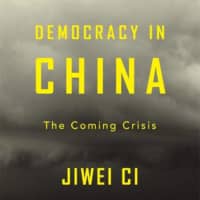As the pro-democracy movement has roiled Hong Kong and people worldwide lament China’s lack of transparency surrounding the coronavirus outbreak, it seems like auspicious timing for Jiwei Ci’s new book, “Democracy in China: The Coming Crisis.”
Ci, a philosophy professor at the University of Hong Kong, argues that the Chinese Communist Party should end its authoritarian rule and open the country to political democracy. As Chinese society becomes increasingly egalitarian and the Communist Party loses its legitimacy, Ci argues that, without a sharing of political power and more agency for the people, a political crisis may end the regime within the next 10 to 20 years. A democratic opening, he concludes, is in the CCP’s best interest, the sole avenue for its survival.
Ci admits that many Chinese, satisfied with their gains in security and prosperity, may choose meritocratic capitalism over personal freedoms. But as living standards have improved for many, endemic corruption and harsh surveillance have created, according to Ci, “an incalculable psychological cost in the form of resentment and fear and a sense of impotence ... burned into the national psyche.”
It is bold claims like this that readers may want to see supported empirically. Ci excels in unpacking middle-class sentiment and interparty loyalties and contradictions — as well as the extent to which contemporary China is already democratic — but his prose tends toward philosophical abstraction. Nonetheless, “Democracy in China” appeals through erudite insights and its stakes for the future of a global powerhouse.


















With your current subscription plan you can comment on stories. However, before writing your first comment, please create a display name in the Profile section of your subscriber account page.